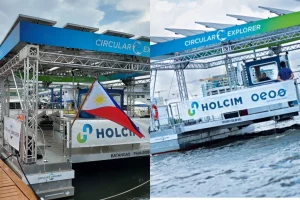Cement manufacturing company Holcim, together with environment organization One Earth One Ocean, early this month launched Circular Explorer, the first solar-powered catamaran designed to preserve marine ecosystems.
The vessel will be used for the first time to clean up and recycle plastic wastes recovered from the coastal areas of Manila Bay.
In partnership with the University of the Philippines Marine Science Institute (UP MSI), the project launched on July 7 also aims to educate and empower students and communities to practice environmental sustainability through a more science-driven approach to ocean research.
With its built-in sensors and micro-plastic collectors on board, the Circular Explorer can clear up to four tons of plastic materials per day.
Over the past 15 years, Holcim has recycled more than 20 million tons of materials into alternative fuels, according to its president and CEO, Horia Adrian.

“The Circular Explorer is a symbol of Holcim’s commitment to sustainability. […] By 2024 we will become the first company in our sector in the Philippines to operate solar panels in our plants,” said Adrian.
In line with its goal to collaborate with like-minded organizations, Holcim has partnered with companies like ECOPlanet, a green cement company, in order to forward their calls for more sustainable and greener building solutions.
According to Deo Onda, UP MSI deputy director for research, scientific innovations such as Circular Explorer are essential contributions to solving environmental concerns.
“Now more than ever, we need science to help us understand the environmental challenges we are facing and to guide us with equitable and sustainable solutions,” said Onda.
Onda also added that providing the public and the government with science-based research can help educate them to take action for sustainability.
Building more by using less
Magali Anderson, Holcim Chief Sustainability and Innovation, emphasized the company’s advocacy of building more infrastructure using less material.
“With today’s population and urbanization on the rise, Holcim is committed to improving living standards for all by building more with less. That’s why we are driving circular construction as a global leader in material recycling to build a net-zero future that works for people and the planet,” she said.
The cement company engages with communities around the world to advocate for circular living — a sustainable way to address climate change by reducing consumption and waste of resources.
In line with its commitment to circular construction, the firm engages with cities around the world to accelerate the shift toward a circular economy.
In April 2022, Holcim Group and Bloomberg Media launched the Circular Cities Baromometer to showcase the top 25 cities around the world leading the shift to circular living. Quezon City was included in this global ranking for its circular systems and leadership.
Quezon City pioneered the implementation of waste-to-energy power plants and has banned the use of single-use plastics since 2019. Residents from the city can also pay their utility bills with credits or “environmental points” from turning over recycled materials.
(This article, written by Regina Adolfo, was first published in the InterAKSYON Website on July 22, 2022)
